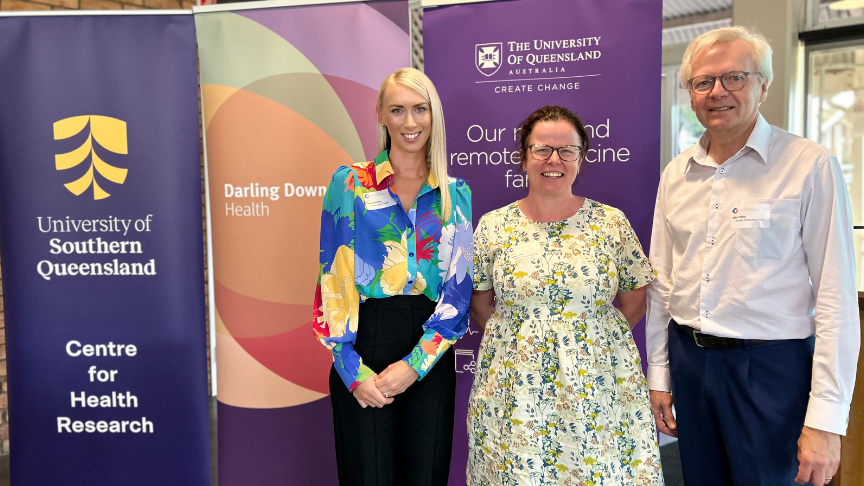
Download high resolution image [JPEG 2.3 MB]
At last year’s Darling Downs Health and Innovation Research Collaborative’s (DDHIRC) research symposium, Teleoncology Clinical Nurse Consultant Naomi Kinast, pitched a research idea that evaluates the experience of cancer care patients receiving their treatment remotely.
This year, Mrs Kinast presented symposium attendees with an update on the teleoncology research project and its implementation across Darling Downs Health.
“This model of care is really important; we have a lot of patients that would actually decline cancer care treatment altogether because the burden of travel is just too great.
“We submitted the pitch at the symposium last year and were successful in achieving a $5000 DDHIRC grant. The grant has been really instrumental in getting our project up and going,” Mrs Kinast said.
Health Translations Queensland Executive Director, Professor John Prins said symposiums were crucial to improving health outcomes for Queenslanders.
“These events are great, to have people of multiple disciplines, from multiple regions and different skillsets together with the same purpose of trying to improve healthcare, it just works.
“We have enormous opportunities in Queensland to continue to make it easier for people in rural and remote areas to access health, especially through the likes of digital communications. Research on the use of digital communications will have enormous benefit to the patients and entire system,” Professor Prins said.
Darling Downs Health Director of Research Dr Anna Tynan said the purpose of the DDHIRC symposium is to empower rural and remote clinicians to undertake research in the regions.
“At Darling Downs Health we’re constantly looking for ways to introduce new treatments and processes to ultimately improve patient outcomes and experiences, making symposiums a crucial research tool for us.
Darling Downs Health Director of Research Dr Anna Tynan
“This year’s theme clinical trials in rural, regional and remote health is particularly important as there’s fantastic research being undertaken in metropolitan areas, but we’re finding that those results and recommendations aren’t easily transferable to the regions.
“If we can come together and bring our expertise from a health service into what’s happening rurally and modify those projects and research, they’re going to make a more meaningful impact,” Dr Tynan said.